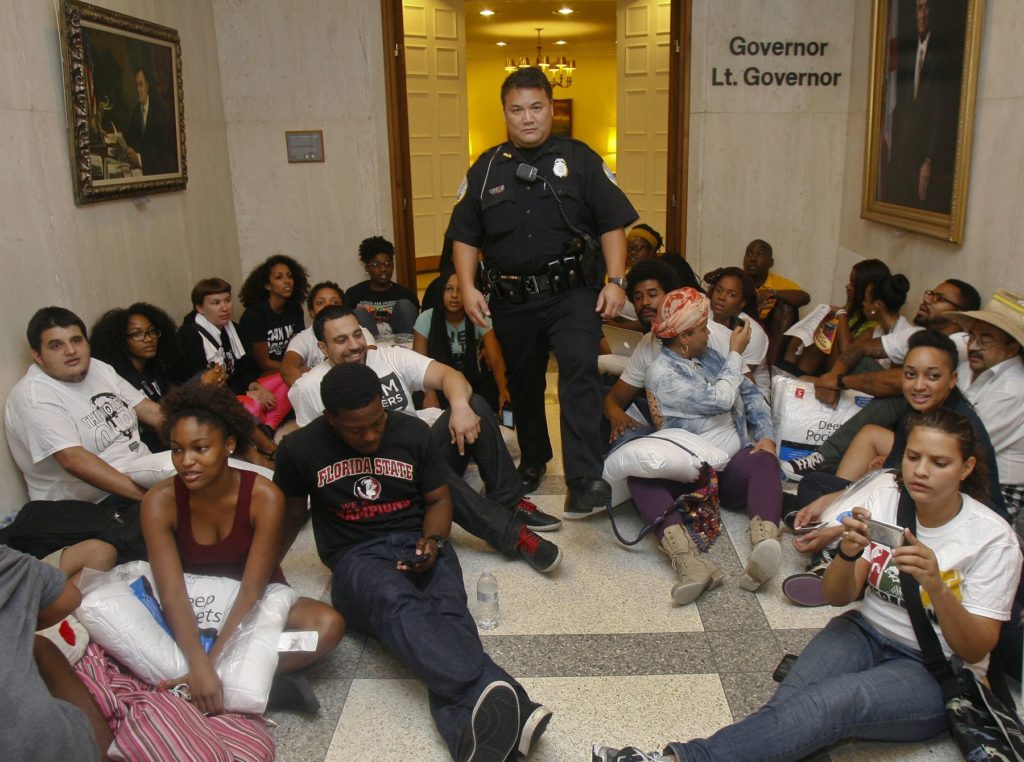Introduction
Allegations of racial profiling of black youth surfaced in Florida and other states long before this month’s jury acquittal of George Zimmerman — the Florida man who shot unarmed black teen Trayvon Martin dead in 2012 after calling police and reporting that a “suspicious” youth was in his neighborhood.

Phil Sears/AP
But last week, following Zimmerman’s acquittal, youth protestors took their anger to Gov. Rick Scott and began camping in front of the Florida governor’s office. The protestors, mostly from the group “Dream Defenders,” say they will stay put until Scott calls a special legislative session on racial profiling and the state’s “Stand Your Ground” law.
“We think ‘Stand Your Ground’ has created a culture that allowed Zimmerman to think that what he did was okay,” said protestor Gabriel Pendas, according to the Tampa Bay Times.
The Republican Scott, who met briefly with protestors last week, was quoted saying: “I believe ‘Stand Your Ground’ should stay in the books.”
The governor said he would not call a special session on the law, but he did tell protestors: “I agree with you, we should not have racial profiling.”
Florida’s Stand Your Ground law was adopted by Florida’s Legislature in 2005.
The law wiped out a person’s “duty to retreat” if facing a threat, and allowed people to make self-defense claims after attacking or killing people in public areas. Since the law’s passage, justifiable homicides in Florida increased from an annual average of about 13 between 2001 and 2005 to a record 66 in 2012, according to the Florida Department of Law Enforcement.
The proposal was pushed by the National Rifle Association, which contributed heavily to Republican legislators running for office and who control the Sunshine State’s legislature, as the Center for Public Integrity reported.
At Scott’s request, Florida’s Department of Juvenile Justice Secretary Wansley Walters met with the young activists outside his office on Monday.
According to the Miami Herald, Walters discussed problems affecting youth, including the so-called “school-to-prison pipeline.”
The phrase refers to the argument, catching on among juvenile court judges and probation officers, that overly harsh school discipline of students — suspensions, expulsions, ticketing, arrests — can actually increase, not decrease, kids’ risks of going on to more trouble with law.
The National Council of Juvenile and Family Court Judges is urging schools to back away from sending students accused of relatively minor infractions into courts, complaining that such interactions only increase students’ risk of failure at school.
Walters, during her discussion with Florida protestors, reportedly told protestors: “I am not a supporter of zero tolerance. I think when you work with kids things should be handled on a case-by-case basis.”
While Scott seems unwilling to yield to protestors’ demands, Florida’s Democratic minority Senate leader, Chris Smith of Fort Lauderdale, said he’s calling for a hearing on the Stand Your Ground law in September. Democratic leaders of the state’s House of Representatives, also controlled by the GOP, backed Smith’s idea.
At least 21 states now have Stand Your Ground laws similar to that in Florida, according to the National Conference of State Legislatures.
At a rally in Indianapolis on Saturday, protestors on Saturday also called for the creation of a committee to review Indiana legislation that allows the use of deadly force to prevent themselves or someone else from serious harm.
In Anchorage, Alaska, demonstrators in on Sunday gathered signatures for a letter asking the legislature and governor to remove Stand Your Ground language from a self-defense law that was signed into law June of this year.
The Urban Institute found in states with Stand Your Ground laws, racial disparities in the justice system are accentuated. In these states, the killing of black people by whites were more likely to considered justified than the killings of white people by blacks, according to the analysis.
Read more in Education
Juvenile Justice
Conference addresses alternatives to racial profiling, harsh school discipline
Video portions of “We can do better” conference online now
Juvenile Justice
Child sex trafficking: schools could help stop it
Educators can identify and aid troubled kids, Depts. of Education and Homeland Security say

Join the conversation
Show Comments